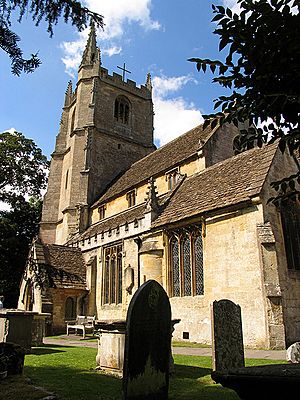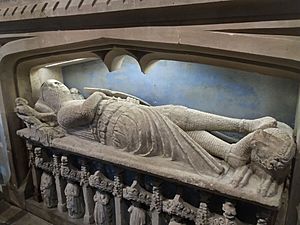St Andrew's Church, Castle Combe facts for kids
Quick facts for kids St Andrew's Church |
|
|---|---|

South side of church
|
|
| Lua error in Module:Location_map at line 420: attempt to index field 'wikibase' (a nil value). | |
| Location | Castle Combe, Wiltshire |
| Country | England |
| Denomination | Anglican |
| History | |
| Status | Parish church |
| Architecture | |
| Functional status | Active |
| Heritage designation | Grade I |
| Designated | 20 December 1960 |
| Completed | 13th and 15th centuries, restored 19th century |
| Specifications | |
| Materials | Rubble stone and ashlar, stone tile roof |
| Administration | |
| Parish | Castle Combe |
| Deanery | Chippenham |
| Diocese | Bristol |
| Province | Canterbury |
St Andrew's Church is a historic building located in the charming village of Castle Combe in Wiltshire, England. It is a parish church, which means it serves the local community for worship. The church was first built in the 13th century, making it very old! Over the years, new parts were added, and it was repaired in the 19th century. Today, St Andrew's is recognized as a Grade I listed building, which means it's a very important historical site.
Contents
What is St Andrew's Church Made Of?
The church building mostly dates back to the 15th century, but some parts are even older, from the 13th and 14th centuries. It is built from strong materials like rubble stone (rough, uncut stones) and ashlar (finely cut stones). The roof is made of stone tiles.
The Church Tower
The tower on the west side of the church was started in 1434. It has many cool features typical of churches from the late Middle Ages. These include pinnacles (small, pointed towers on the roof), diagonal buttresses (strong supports on the outside walls), and battlements (the top parts of the walls that look like castle defenses).
Inside the Church
When you go inside St Andrew's, you'll find a main area called the nave. There are also chapels on the north-east and south-east sides, along with aisles (passageways) and a south porch.
The Lady Chapel and Scrope Family
The Lady Chapel was once the private chapel for the Scrope family, an important family in the area, starting in the mid-15th century. In the early 1800s, the church became a bit wobbly! So, it was repaired, mostly with money from a member of the Scrope family. The roof also had more repairs in 1962. Many decorations inside, like the fittings in the chancel (the area around the altar), show the Scrope family's coat of arms (their special family symbol). There's also a large, fancy monument to the Scrope family in the Lady Chapel.
The Dunstanville Memorial
Inside the Lady Chapel, you can see a very old memorial from the late Norman period. It honors a local lord named Walter de Dunstanville, who passed away in 1270. The stone figure, called an effigy, is shown with its legs crossed. This was a common way to show that the person had been on a crusade (a religious journey or war in the Middle Ages).
Recent Repairs and Features
In recent years, St Andrew's Church has had more important repair projects. The roof was fixed in 2016, and a beautiful medieval screen inside the church was restored in 2018. The church also has an organ that was given in 1911 and updated in 1988.
One of the most interesting things at the church is a medieval clock at the bottom of the tower. It's a special "faceless clock," meaning it doesn't have a clock face with numbers! It's still working today.
Churchyard and Tombs
Outside the church, in the churchyard, there are many old tombs, memorials, and monuments. Twenty-five of these are also listed as Grade II historic buildings, showing their importance.
Is the Church Still Used?
Yes, St Andrew's Church is still very much active! It is part of the Bybrook Team Ministry and is regularly used for church services and community events.
See also
- List of Grade I listed buildings in Wiltshire


